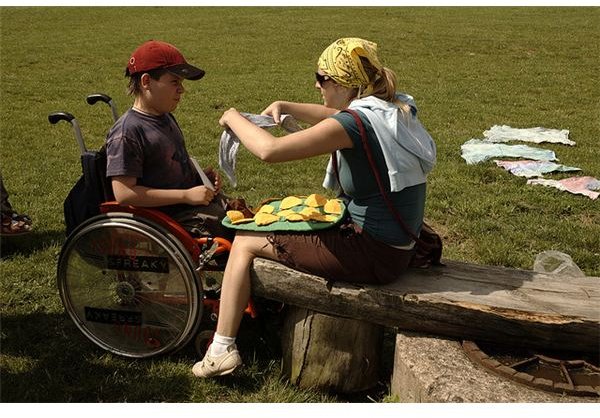Summer Safety and the Child With Special Needs: Keeping Summer Safe for These Extraordinary Kids
Prepare and Prevent
Summer is underway, and although it is a wonderful and lighthearted time of year, it can be one of the most dangerous. Planning for appropriate summer safety and the child with special needs’ well-being can bring up even more areas of concern.
Everyone looks forward to enjoying the sun, water, outdoor games, family get-a-ways and other special outings, but all too often, these occasions can turn into uncomfortable situations or can even be marred by tragedy if families are not prepared. Accidents can happen, no matter how well we plan. However, we can better prepare our kids and ourselves for what summer has in store.
By learning and using input from special needs parents, medical professionals and community organizations, children with medical, developmental and emotional needs can share in an array of summer activities without harmful effects. Prevention is the key and help is available to unlock the process.
Information, Information, Information
Everyone involved in the special needs child’s daily routine should be involved in his summertime activity planning. Families often employ additional assistance during this time of year. According to Candi Wingate, President of Nannies4Hire, parents need to realize that the more information given these employees, the better.
“Babysitters should be given any medicine or equipment instructions, and should receive a thorough explanation on any regular procedures required,” Ms. Wingate advises.
In addition, if a child is prone to seizures or has specific allergic reactions that call for shots, the caregiver needs to know the proper protocol for handling such situations.
Ms. Wingate adds, “Before hiring a sitter, ask if she’s ever dealt with special needs emergencies and if so, what were they and how were they handled? New personnel definitely need to be copied on the names of medical team members who care for your child, as well as a list of family emergency procedures.”
Another must involves reminding and refreshing all family or friends who help out in the summer of procedures and protocols. Even though brothers and sisters, grandparents or neighbors are involved with the special needs child on a regular basis, there are still some things unique to summertime that even the most familiar need to review.
For example, heat issues (which may not be so obvious) can pose a real danger in a very short span of time. Children with spina bifida are particularly at risk for some of these unusual sensitivity problems.
“We are constantly on guard during the summer,” says Amanda Graybill, parent of an 11-year-old with spina bifida. “We are truly grateful that our daughter is able to walk; but she has very little feeling in the lower extremities, so a brief walk around the pool or sitting on the side of the pool can cause tremendous damage very quickly when she can’t feel the extreme heat!”
Other heat exposure problems, not so commonly recognized, include dangerous side effects from certain meds if a child is not properly hydrated. Some seizure medications should be more closely monitored in extreme heat due to a child’s inability to perspire normally.
A former school psychologist and coach to parents of special needs kids shares a tip which can make a huge difference in teaching a child to respond correctly to specific dangers she may face.
“Rehearsing the behavior you want kids to repeat is number one,” says Tina Feigal with the Center for the Challenging Child.
Using the practice method with kids who have autism, ADHD or other developmental delays is particularly helpful. She advises choosing key words or phrases, along with repetitive movements, to get the child acclimated to all necessary safety steps.
Whether prepping for swimming, bike riding, going next door to the neighbor’s house to play or learning how to respond to strangers, all these areas should include certain pre-requisites that need to be practiced repeatedly.
“We’ve seen wonderful results in children who’ve been properly rehearsed and are convinced that safety guidelines are best learned in this fashion,” states Ms. Feigal.
Check out websites (as listed in the References section) for adaptive devices and other tips for summer activities, and of course, rely on the family physician, physical/occupational/speech therapists as great resources.
Parent’s Checklist: A Must
When preparing for other summer activities, families are accustomed to making an assortment of lists to aid planning. It is equally important to organize and post a listing of the “Special Needs Safety Tips Checklist” to ensure summer safety for the child with special needs.
These tips should include instructions for travel, water safety, heat precautions, medications, allergy issues and communication/social skills. Special supplies needed by your child (catheters, epi-pens, etc.) should also be itemized. When the family and other caregivers are comfortable with directions, everybody’s summer will be more fun-filled and less stressful.
References
- Personal interview, June 14, 2011, Graybill, Amanda, RN, Clinical Case Manager, Lewis-Gale Medical Center, Salem, VA and Parent of Special Needs Child
- E-mail interview, June 14, 2011, Bjork,Erika, Managerof PR and Interactive Marketing @ gatewaypath.com www.gatepath.com
- E-mail interview, June 14, 2011 - Feigal, Tina, M.S., Ed., Author and Owner, Parent Coach and Trainer, “Center for the Challenging Child,” Roseville, MN, www.parentingmojo.com
- E-mail interview, June 14, 2011, Wingate, Candi, President, Nannies4Hire, Norfolk, NE www.nannies4Hire.com
- Image Source: flickr.com/honzasoukup
- E-mail interview, June 14, 2011, Hodges, Louise, Greenbug All Natural Pest Control Products,
- E-mail interview, June 14, 2011, Lobello, Janelle, Communications Director, Christopher and Dana Reeve Foundation, Short Hills, NJ
- Streett, Barbara, “Top Travel Destinations for Kids with Special Needs,” Ability Path
